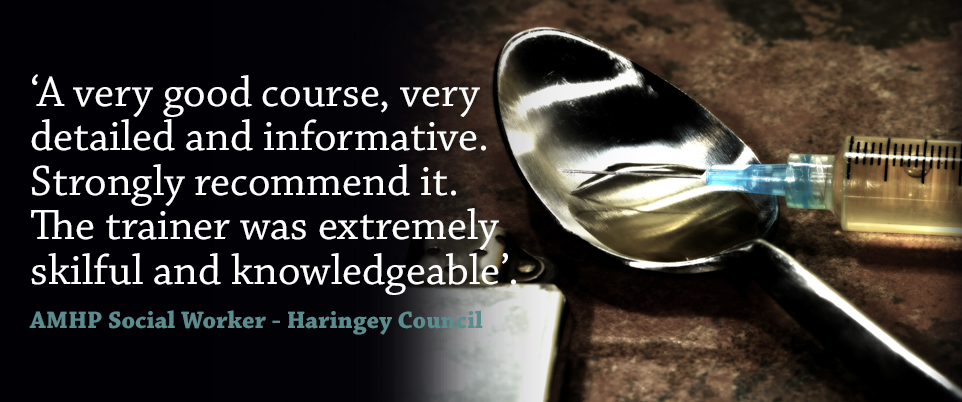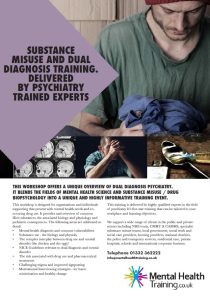This workshop is designed for organisations and individuals supporting that present with mental health needs and co-occurring drug use. It provides and overview of common illicit substances, the associated biology and physiology and psychiatric consequences. The following areas are addressed in detail:
- Mental health diagnosis and common vulnerabilities
- Substance use – the biology and physiology
- The complex interplay between drug use and mental disorder (the chicken and the egg)?
- NICE Guidelines relevant to dual diagnosis and mental disorder
- The risk associated with drug use and pharmaceutical treatments
- Challenging stigma and improved signposting
- Interviewing strategies – for harm minimisation and healthy change
Please click the leaflet image to download a PDF overview of this training
The workshop offers an overview of psychoactive substances and the physiological impact of drug taking on the body and mind in relation to mental disorder.
Commonly this workshop expands into a Dual Diagnosis training event that considers substance misuse and general psychiatry from an integrated perspective. All training is bespoke-designed to meet your organisation’s exact needs, so please consult with us if you have specific learning needs
Here’s an example overview of a typical training workshop (10 bullet points):
Here’s an example overview of a typical training workshop (10 bullet points):
1 – The types of illicit drugs that are misused in the UK, Their classifications, effects on the central nervous system and body and the associated organic and psychological / psychiatric harms;
2 – Symptoms of intoxication and withdrawal. How to identify the symptoms of intoxications and withdrawal;
3 – Novel Psychoactive Substances and SCRAs (ie.SPICE). The latest science and associated risks;
4 – The brain on drugs, the psychobiology of addiction and psychological factors that increase resistance to health-focussed advice and support;
5 – Prescription medication misuse and dependency. A classification of pharmaceuticals, their effects and abuse potential and the risk factors of congesting pharmaceuticals and illicit substances;
6 – A key focus on illicit substances and alcohol dependency and the relationship with mental disorder and alcohol-related dementias and cognitive disorders;
7 – Dual diagnosis factors with a key focus on NICE Guidelines and the obligations / responsibilities within the NHS to support individuals with co-occuring mental disorder and substance misuse / dependency;
8 – Understanding the principles of motivational counselling. Tips to working with, and supporting people with substance dependency. Working with people vulnerable and dependant on illicit substances and drugs of misuse -The principles of substance misuse counselling;
9 – Understanding and employing the harm minimisation model into counselling / support strategies;
10 – Delivered by a psychiatry-qualified consultant. Evidence-based training with access to a wide range of peer-reviewed articles associated with suicide science and access to free post-training support;
Training facilitators:
This training is delivered by facilitators trained in psychiatry and specialise in general psychiatric illness and abnormal psychology, personality disorder and stress-related illness training. We offer a wide-ranging, multi-disciplinary knowledge and skills with high quality, integrated evidence-based training that you can trust.
Mental Health Training also provide Dual Diagnosis training and an overview of this workshop can be downloaded here: Dual Diagnosis training



